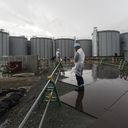Japan to treat and release water contaminated in Fukushima disaster into sea

Japan's government on Tuesday announced plans to release more than 1 million metric tons of contaminated water from the destroyed Fukushima nuclear plant into the Pacific Ocean following a treatment process.
Why it matters: While the Biden administration has said Japan appears to have met globally accepted nuclear safety standards, officials in South Korea, China and Taiwan, local residents, those in the fishing industry and green groups oppose the plans, due to begin in about two years, per the Guardian.
- The announcement brings to a close years of debate on how to discard the accumulating water that's been leaking at the plant in Fukushima Daiichi plant in Ōkuma from the 2011 nuclear disaster, caused by an earthquake and tsunami.
Driving the news: Water meant to cool nuclear material has been continually escaping from reactors damaged in the disaster.
- "To make up for the loss, more water has been pumped into the reactors to continue to cool the melted fuel," per AP. "Water is also pumped out and treated, part of which is recycled as cooling water, and the remainder stored in 1,020 tanks now holding 1.25 million tons of radioactive water."
Details: Japan's Ministry of Economy, Trade and Industry said in a statement the water would be treated and diluted to reduce radiation levels to below those set for drinking water. The process is expected to take decades to complete.
- Tokyo Electric Power, the plant's operator, and government officials have said most radioactive elements can be removed, except for tritium, a material that's unharmful in small amounts.
- Government officials will step up efforts to monitor radioactivity, according to the ministry.
- "Storage tanks for the water at the site are forecast to be full by mid-2022," Bloomberg reports.
Of note: There's enough water at the facility to "fill more than 500 Olympic-sized swimming pools," Bloomberg notes.
What they're saying: Japanese Prime Minister Yoshihide Suga told a meeting of ministers Tuesday releasing water used to cool nuclear fuel into the sea was the "most realistic" choice and "unavoidable in order to achieve Fukushima's recovery," the Guardian notes.
- "The Japanese government has compiled basic policies to release the processed water into the ocean, after ensuring the safety levels of the water," Suga added. "And while the government takes measures to prevent reputational damage."
State Department spokesperson Ned Price said in an emailed statement, "In this unique and challenging situation, Japan has weighed the options and effects, has been transparent about its decision, and appears to have adopted an approach in accordance with globally accepted nuclear safety standards."
- The Biden administration looks forward to Japan's "continued coordination and communication" as it monitors this approach, he added.
The other side: South Korea's foreign minister expressed "serious regret" at the announcement, per the BBC.
- China's foreign ministry said in a statement, "To safeguard international public interests and Chinese people's health and safety, China has expressed grave concern to the Japanese side through the diplomatic channel."
- Greenpeace climate and energy campaigner Kazue Suzuki said in a statement Japan's government had "discounted the radiation risks and turned its back on the clear evidence that sufficient storage capacity is available on the nuclear site as well as in surrounding districts."
Of note: The International Atomic Energy Agency said in an April 2020 report that recommendations by Japan's Ministry of Economy, Trade and Industry that the water released into the sea or evaporated were "aligned with current international good practices."
- The proposals were "based on a sufficiently comprehensive analysis and on a sound scientific and technical basis," the agency added.